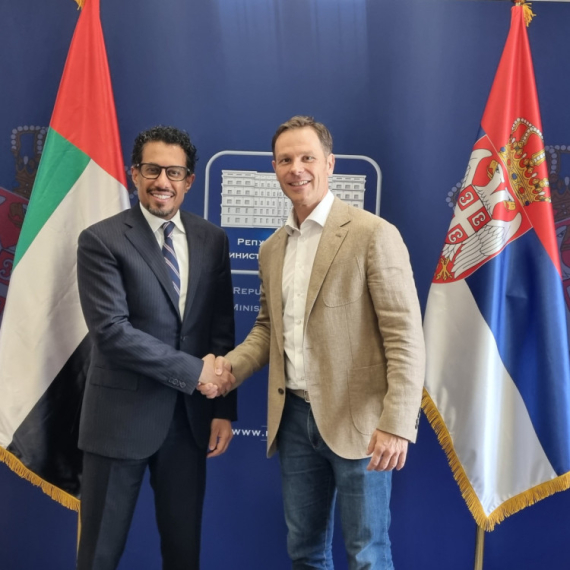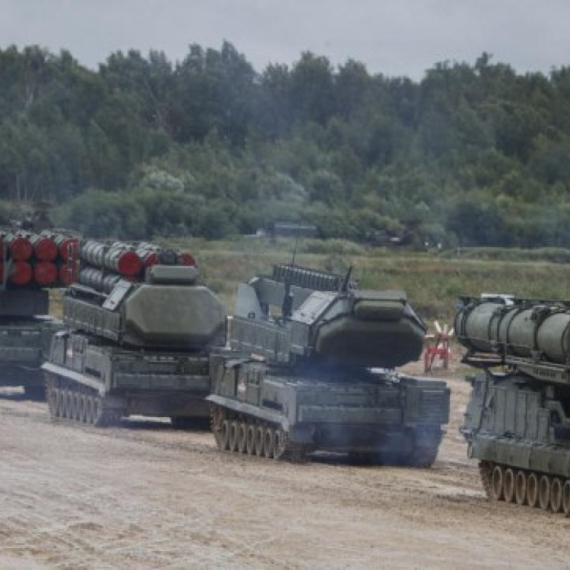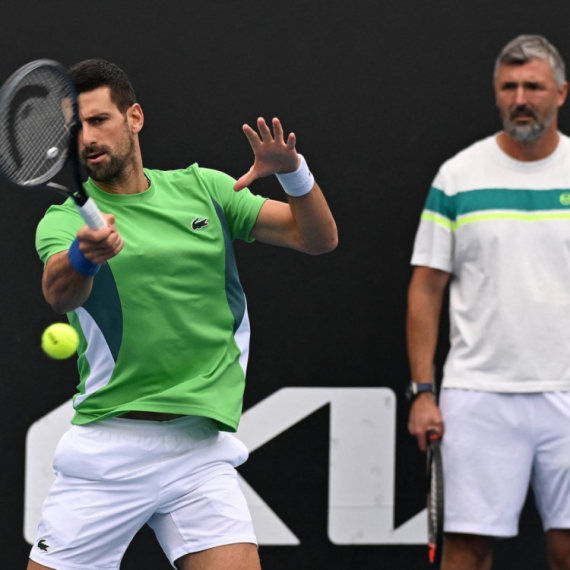Elections and negotiations
Sunday, 02.12.2007.
13:55

Elections and negotiations There is now a fierce scramble to bring on board enough deputies from other parties to put together a ruling coalition. These potential "kingmakers" can exact hefty concessions in return for their support. One of the most significant facts about the election is the lack of interest of most of the international community in who actually wins it. Both the leading contenders are seen as being committed to the path of Euro-Atlantic integration. This "lack of interest" is therefore actually a very positive complement and demonstrates again that Croatia is on track for EU membership. It is interesting however, that if the HDZ does get the mandate, it will be due to winning all the deputies designated for the Diaspora. The vast majority of this Diaspora are Croats who live in and are citizens of Bosnia who also have applied and received Croatian citizenship. It will be one of the rare times in history when individuals who have never physically lived in a country (and do not pay taxes in it) have by their votes determined its government. The truly nationalist parties (the HSP and the newly-formed party of Glavas) did abysmally in the elections. Far below the numbers they received in earlier elections. This is because Croatia does not have major unresolved territorial issues such as Kosovo; has put its problems with International Criminal Tribunal for the former Yugoslavia (ICTY) behind it; and there are no major confrontational issues with the International Community. Its citizens are concerned primarily with economic issues and standard of living. The contrast with Serbia is striking. Many of the challenges facing the new government have existed in Croatia for over ten years now. Thus far, none of the governments have been able (or willing) to satisfactorily address them. They remain impediments to Croatia's overall progress. They include: -The judicial system. The European Union has consistently pointed to flaws in this system and little, if anything has been done about it. One example is that there are over one million lawsuits currently pending. Delays in both criminal and civil trials remain a big problem. There is also intense pressure on the judiciary in the frequent cases dealing with the wartime years. The response to this pressure has been very uneven. -The amount of properties and enterprises owned in whole or large part by the state or state pension funds. This runs from newspapers to marinas, hotels, and gasoline stations. It includes prime locations still held by the military although its need for them has long past. It also includes countless villas and apartments. This remnant of the communist system remains in place in large part because specific individuals are benefiting from it to the detriment of the country as a whole. Many of these enterprises actually continue to receive large subsidies from the government. Moreover, having these holdings opens the door to the potential for corruption. -The system of "veza" and the bureaucracy. Sometimes it is pure corruption. Sometimes it is doing a favor for a friend or associate. Sometimes it is deliberately blocking needed paperwork out of spite, wanting to show one's "power," or because the applicant is viewed as an opponent of some kind. Often it is simply the complexity and sluggishness of the bureaucratic system. But the end result is that Croatians routinely are stymied from doing their legitimate business in a timely way; those "in the know" get permits on a "fast track" and learn in advance what properties in new urban plans will be re-classified for development; others find getting building permission to be frustrating, time-consuming and costly. The culture rewards those who "use" the system instead of having a system in place designed to fairly, quickly, and efficiently deal with everyone. It is rooted deep in many elements of Croatian society (as it is throughout much of the region) and changing it will be very difficult. -Relations with Croatian Serbs. The fact is that the brutality of the war years has left deep scars on many people of all ethnic groups throughout the Balkans. To a very large extent, the victims in Croatia knew some or all of the perpetrators. They often were from the same village. Expecting these ethnic groups to reconcile and go back to living together in harmony in these villages and towns in less than a generation or two is unrealistic. Thus, there is and will be for the foreseeable future issues of discrimination and mistreatment directed at Croatian Serbs. Like its predecessors, the future government will walk the fine line of satisfying to some extent the concerns (and pressure) from the International Community in this regard, but will do so carefully and selectively to avoid a nationalistic backlash. -Uneven economic growth. Zagreb is booming. Tourism is transforming the Dalmatian coast. But other areas of Croatia remain undeveloped with high unemployment and low standards of living. No government has been successful in attracting investment into these depressed areas. Meanwhile, the last negotiating session hosted by the Contact Group Troika (representatives from the EU, US, and Russia) over Kosovo ended as expected with no breakthroughs. It seems as if it is not a question of what will happen next, but only exactly when it will happen and how. At some point in the next two months, the Kosovo Albanians will begin the procedure leading to unilateral independence. This will be done in close consultation with the United States and key EU states. The major Kosovo Albanian player in this process will almost certainly be Hashim Thaci, as his party won more votes in the recent elections than the next two parties combined. The only question is who will his coalition partners be. The West and Thaci are very disappointed that the ORA party of Veton Surroi just missed passing the 5% threshold and thus apparently did not get into Parliament. They see his party as a good coalition partner and a strong, moderating force in any future government. It will be interesting to see if the "final count" shows that Surroi actually made it over that threshold….What is certain is that Thaci will not form his coalition until the final election results clarify this issue. There is no love lost between him and many of the other Kosovo Albanian parties. With the death of Ibrahim Rugova, his party (the LDK) has lost its cohesion and to some extent its direction. A sizeable break-away group took with it about one-third of its supporters. As a result the LDK for the first time was soundly defeated. It got only 22% as opposed to 34% for Thaci's party. It is hard to see this trend changing in the months ahead. Particularly if it is not included in any coalition government. Finally, and most importantly, the Kosovo Serb electoral boycott was almost a complete "success." As a direct result, the Kosovo Serbs lost control of five different opcinas where they have until now formed the local government. This presents UNMIK, KFOR, and the OSCE with an interesting dilemma. If they enforce the results of the elections and install Kosovo Albanians in the local government offices, the potential for violence is extremely high. On the other hand, if they do not do so, what does it say for the rule of law and the validity of the entire election process? Early indications are that the International Community is looking for any sort of "out" to avoid a confrontation with the Kosovo Serbs in these five opcinas. There is talk of delays, of tacitly allowing parallel governments, and so on. While this is understandable on one level, it should also be clear that the response to this question will say a lot about the likely response to the establishment by the Kosovo Serbs of their own "zones" in the event of a unilateral declaration of independence. In other words, an overwhelming show of force to insist on the installation of the newly-elected Kosovo Albanian officials would be a powerful signal that attempts to set up Serbian zones which reject the authority of any Kosovo Albanian government would not be tolerated. On the other hand, avoiding such a confrontation now, sends exactly the opposite message. My "read" on the situation is that there is a huge gap between the enthusiasm and determination of the United States and the EU to support unilateral independence and their ability and willingness (or lack thereof) to use KFOR to enforce it throughout Kosovo. No clear winner: PM Ivo Sanader votes (FoNet) Croatian Parliamentary elections were held this past week. The result is uncertain, as neither of the two major parties received enough votes to form a government by itself. William Montgomery "It is interesting however, that if the HDZ does get the mandate, it will be due to winning all the deputies designated for the Diaspora. The vast majority of this Diaspora are Croats who live in and are citizens of Bosnia who also have applied and received Croatian citizenship."
Elections and negotiations
There is now a fierce scramble to bring on board enough deputies from other parties to put together a ruling coalition. These potential "kingmakers" can exact hefty concessions in return for their support.One of the most significant facts about the election is the lack of interest of most of the international community in who actually wins it. Both the leading contenders are seen as being committed to the path of Euro-Atlantic integration.
This "lack of interest" is therefore actually a very positive complement and demonstrates again that Croatia is on track for EU membership.
It is interesting however, that if the HDZ does get the mandate, it will be due to winning all the deputies designated for the Diaspora. The vast majority of this Diaspora are Croats who live in and are citizens of Bosnia who also have applied and received Croatian citizenship.
It will be one of the rare times in history when individuals who have never physically lived in a country (and do not pay taxes in it) have by their votes determined its government.
The truly nationalist parties (the HSP and the newly-formed party of Glavaš) did abysmally in the elections. Far below the numbers they received in earlier elections. This is because Croatia does not have major unresolved territorial issues such as Kosovo; has put its problems with International Criminal Tribunal for the former Yugoslavia (ICTY) behind it; and there are no major confrontational issues with the International Community. Its citizens are concerned primarily with economic issues and standard of living. The contrast with Serbia is striking.
Many of the challenges facing the new government have existed in Croatia for over ten years now. Thus far, none of the governments have been able (or willing) to satisfactorily address them. They remain impediments to Croatia's overall progress. They include:
-The judicial system. The European Union has consistently pointed to flaws in this system and little, if anything has been done about it. One example is that there are over one million lawsuits currently pending. Delays in both criminal and civil trials remain a big problem. There is also intense pressure on the judiciary in the frequent cases dealing with the wartime years. The response to this pressure has been very uneven.
-The amount of properties and enterprises owned in whole or large part by the state or state pension funds. This runs from newspapers to marinas, hotels, and gasoline stations. It includes prime locations still held by the military although its need for them has long past. It also includes countless villas and apartments. This remnant of the communist system remains in place in large part because specific individuals are benefiting from it to the detriment of the country as a whole. Many of these enterprises actually continue to receive large subsidies from the government. Moreover, having these holdings opens the door to the potential for corruption.
-The system of "veza" and the bureaucracy. Sometimes it is pure corruption. Sometimes it is doing a favor for a friend or associate. Sometimes it is deliberately blocking needed paperwork out of spite, wanting to show one's "power," or because the applicant is viewed as an opponent of some kind. Often it is simply the complexity and sluggishness of the bureaucratic system.
But the end result is that Croatians routinely are stymied from doing their legitimate business in a timely way; those "in the know" get permits on a "fast track" and learn in advance what properties in new urban plans will be re-classified for development; others find getting building permission to be frustrating, time-consuming and costly. The culture rewards those who "use" the system instead of having a system in place designed to fairly, quickly, and efficiently deal with everyone. It is rooted deep in many elements of Croatian society (as it is throughout much of the region) and changing it will be very difficult.
-Relations with Croatian Serbs. The fact is that the brutality of the war years has left deep scars on many people of all ethnic groups throughout the Balkans. To a very large extent, the victims in Croatia knew some or all of the perpetrators. They often were from the same village. Expecting these ethnic groups to reconcile and go back to living together in harmony in these villages and towns in less than a generation or two is unrealistic.
Thus, there is and will be for the foreseeable future issues of discrimination and mistreatment directed at Croatian Serbs. Like its predecessors, the future government will walk the fine line of satisfying to some extent the concerns (and pressure) from the International Community in this regard, but will do so carefully and selectively to avoid a nationalistic backlash.
-Uneven economic growth. Zagreb is booming. Tourism is transforming the Dalmatian coast. But other areas of Croatia remain undeveloped with high unemployment and low standards of living. No government has been successful in attracting investment into these depressed areas.
Meanwhile, the last negotiating session hosted by the Contact Group Troika (representatives from the EU, US, and Russia) over Kosovo ended as expected with no breakthroughs.
It seems as if it is not a question of what will happen next, but only exactly when it will happen and how. At some point in the next two months, the Kosovo Albanians will begin the procedure leading to unilateral independence. This will be done in close consultation with the United States and key EU states.
The major Kosovo Albanian player in this process will almost certainly be Hashim Thaci, as his party won more votes in the recent elections than the next two parties combined. The only question is who will his coalition partners be.
The West and Thaci are very disappointed that the ORA party of Veton Surroi just missed passing the 5% threshold and thus apparently did not get into Parliament. They see his party as a good coalition partner and a strong, moderating force in any future government.
It will be interesting to see if the "final count" shows that Surroi actually made it over that threshold….What is certain is that Thaci will not form his coalition until the final election results clarify this issue. There is no love lost between him and many of the other Kosovo Albanian parties.
With the death of Ibrahim Rugova, his party (the LDK) has lost its cohesion and to some extent its direction. A sizeable break-away group took with it about one-third of its supporters. As a result the LDK for the first time was soundly defeated. It got only 22% as opposed to 34% for Thaci's party. It is hard to see this trend changing in the months ahead. Particularly if it is not included in any coalition government.
Finally, and most importantly, the Kosovo Serb electoral boycott was almost a complete "success." As a direct result, the Kosovo Serbs lost control of five different opcinas where they have until now formed the local government. This presents UNMIK, KFOR, and the OSCE with an interesting dilemma. If they enforce the results of the elections and install Kosovo Albanians in the local government offices, the potential for violence is extremely high. On the other hand, if they do not do so, what does it say for the rule of law and the validity of the entire election process?
Early indications are that the International Community is looking for any sort of "out" to avoid a confrontation with the Kosovo Serbs in these five opcinas. There is talk of delays, of tacitly allowing parallel governments, and so on. While this is understandable on one level, it should also be clear that the response to this question will say a lot about the likely response to the establishment by the Kosovo Serbs of their own "zones" in the event of a unilateral declaration of independence.
In other words, an overwhelming show of force to insist on the installation of the newly-elected Kosovo Albanian officials would be a powerful signal that attempts to set up Serbian zones which reject the authority of any Kosovo Albanian government would not be tolerated. On the other hand, avoiding such a confrontation now, sends exactly the opposite message.
My "read" on the situation is that there is a huge gap between the enthusiasm and determination of the United States and the EU to support unilateral independence and their ability and willingness (or lack thereof) to use KFOR to enforce it throughout Kosovo.
















Komentari 18
Pogledaj komentare